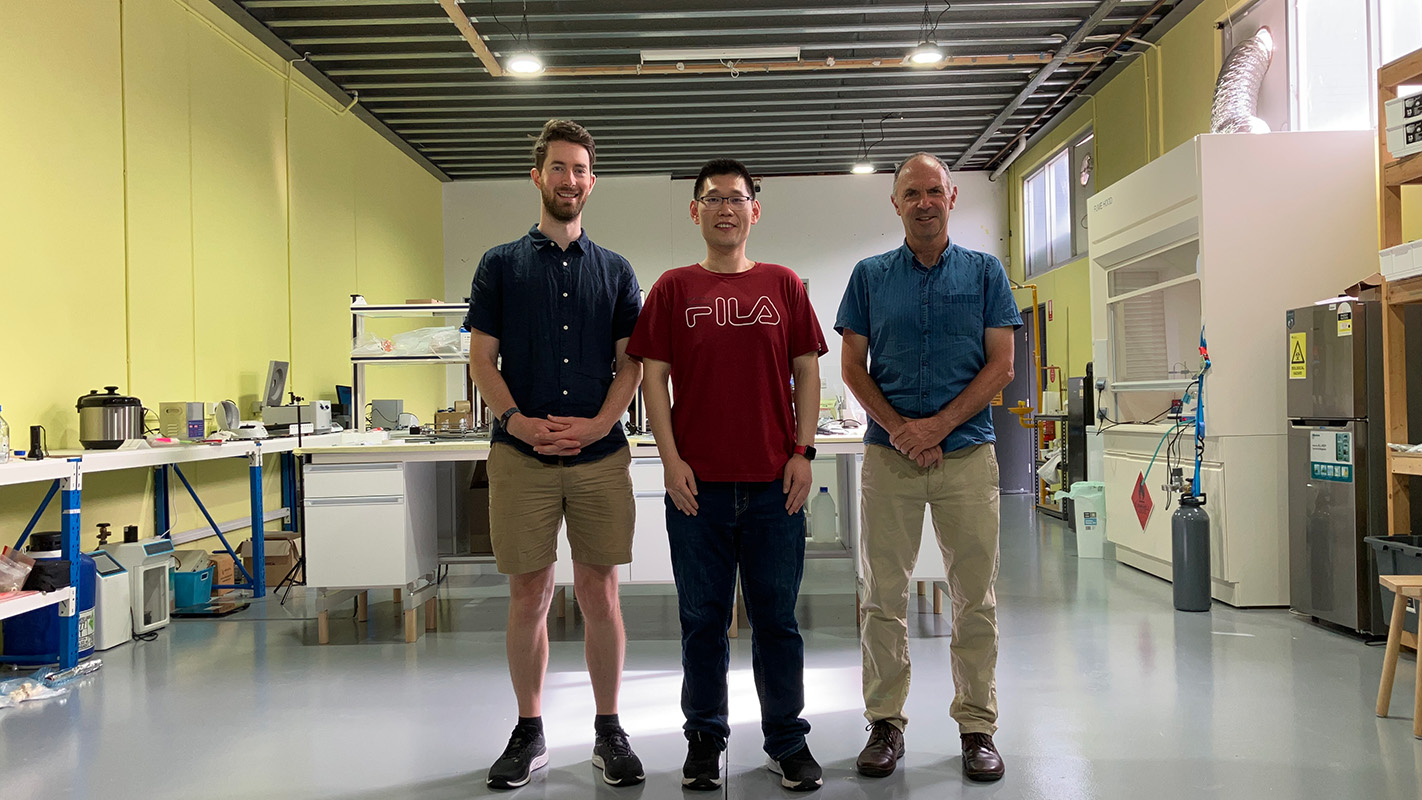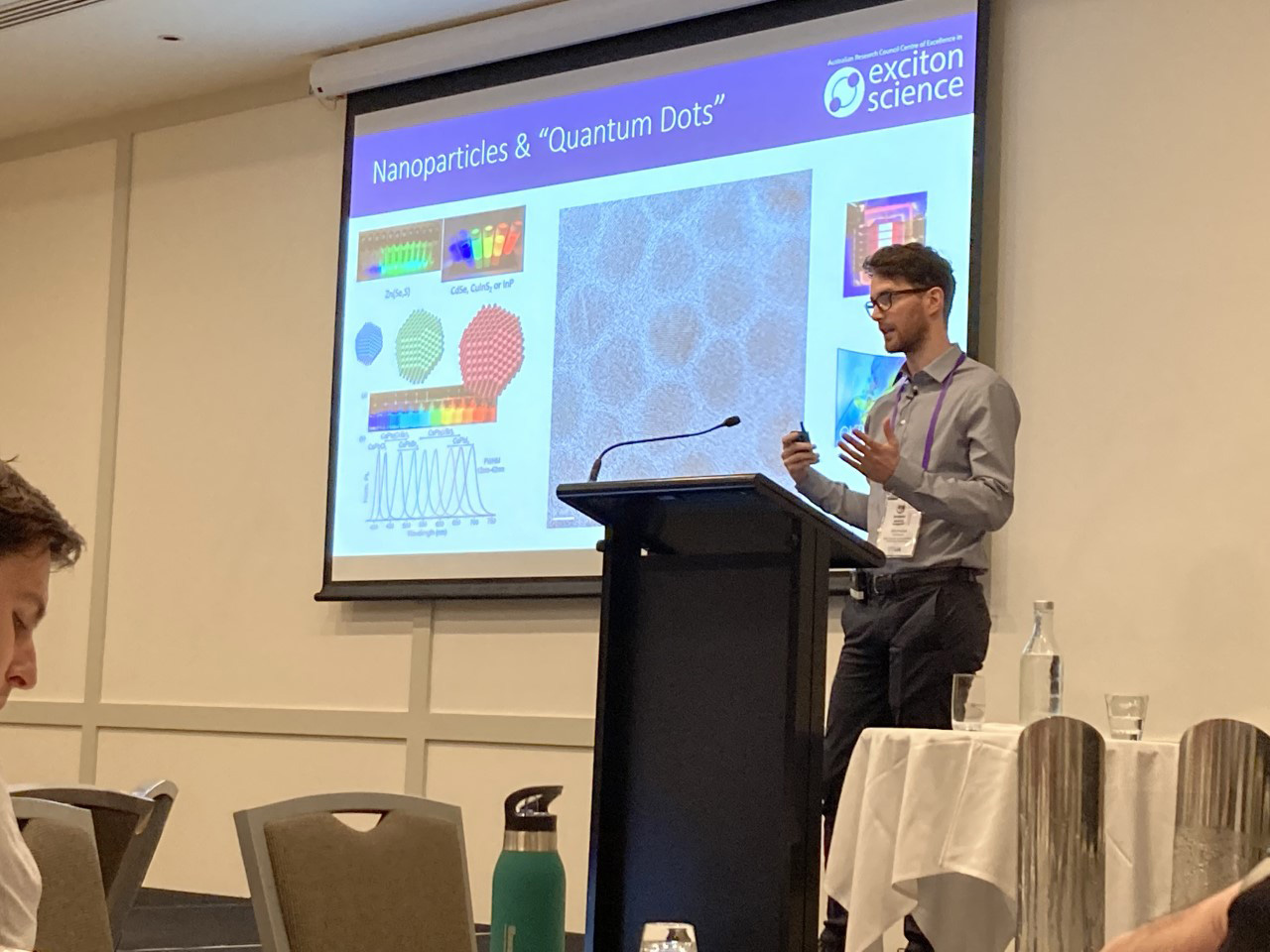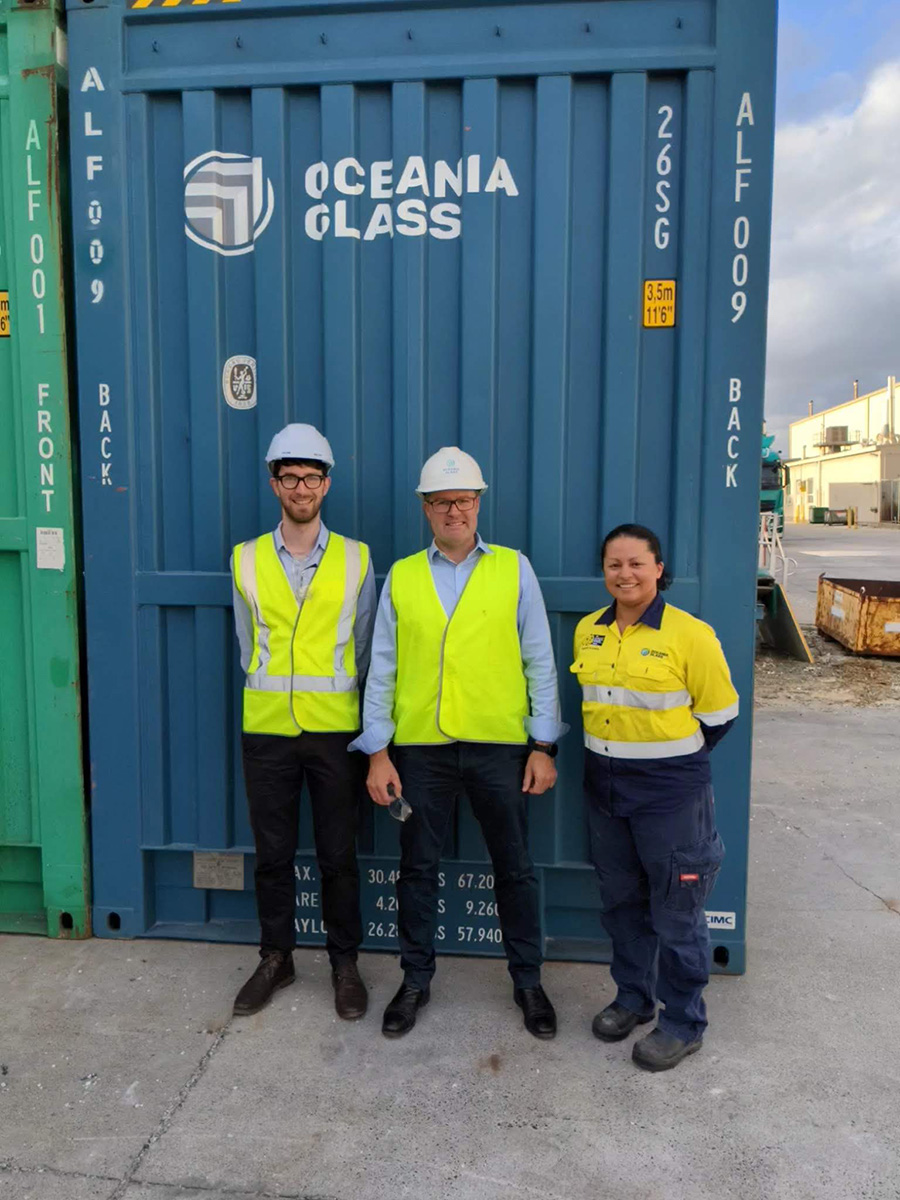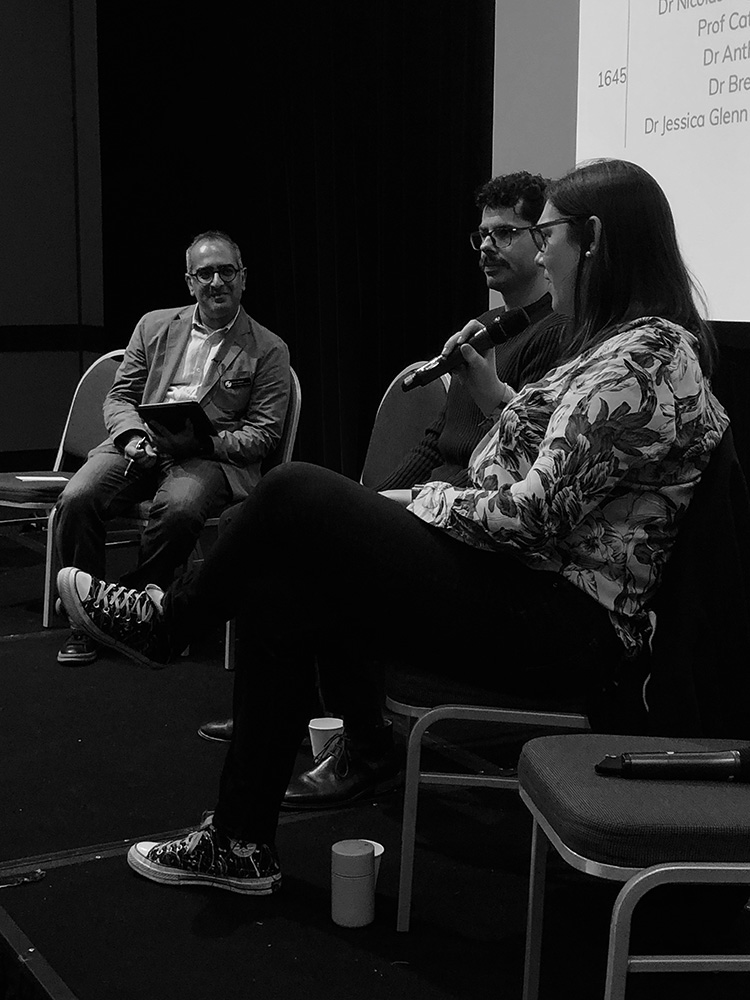Impact
Industry
Through the appointment of a new Science and Industry Liaison Manager and the evolution of our Connect Program, Exciton Science has transformed its relationship with domestic and international industry partners.
Learn how these actions will enable the Centre to achieve and then exceed its ambitious commercialisation goals in the years ahead.
Evolution of Exciton Science Connect Program
Over 2022, the “Exciton Science Connect” internal funding program has been streamlined and adapted to meet the aims of delivering impact, building a Centre legacy, and providing industry-relevant skills to students.
Delivering Impact
To deliver impact a large “Entrepreneurship Funding” option was developed for medium TRL projects with a clearly identified customer or market and a suitable spin-out team, as well as a “Major Project / Industry Postdoc Funding” for any major project/idea with a committed industry partner requiring at least 1 FTE of R&D work over at least one year.
Entrepreneurship Funding is to be used as leverage funding, to rapidly develop a project to the point where external investment is achieved. This will typically involve identification, development and validation of a “minimum viable product” and devising a business plan. The successful applicants are set up with mentors and required to enrol in relevant start-up accelerator programs.
A team led by Dr. Kalim Kashif (Monash University) was awarded the first tranche of Entrepreneurship Funding for their environmentally friendly conductive paint “GreenShield”. The funds were used to support Kalim’s salary while he and his colleagues finalised the IP filing, worked with Defence and other stakeholders to validate the “GreenShield” for use as an electromagnetic/antistatic shielding coating, and developed initial business plans.
The team was successful in securing a spot in the CSIRO “ON Accelerate” program in 2023, through which $20,000 of external investment is already secured, an interim CEO has been employed, and several VC firms have expressed interest in seed investment during or after the ON Accelerate program, pending the creation of a company with IP license options from Monash.
Two Centre Investigators have been awarded Major Project / Industry Postdoc funding. Prof. Tim Schmidt (UNSW) is using this fund to work with Young Henry’s and UTS on agriphotovoltaic fluorescent light harvesting systems, and has employed an engineer to conduct this R&D work. Prof. Jacek Jasieniak (Monash) has used the fund to hire a researcher to help develop improved protective coatings for flexible silicon PV in collaboration with Woodside Energy.
Building a Centre Legacy
In order to build a Centre legacy, the Connect Program has also been adjusted to offer several smaller funding options that aim to boost the number of “pipeline” projects with a much higher level of customer- or market-focused problem-solving than typical University research, and therefore have good prospects of future commercialisation.
The “Prototype Development Fund” of up to $15,000 is available to any researcher or PhD student who wishes to develop a commercially promising idea which requires internal R&D beyond the scope of what the host lab normally funds, and has had one successful application in 2022 and several EOIs for future applications.
An industry collaboration “Seed Fund” of up to $30,000 is also available to CIs and ECRs setting up an industry collaboration. This fund aims to fund initial proof-of-principle type work and build mutual confidence/trust.
Providing industry-relevant skills to students
Throughout 2022 Exciton Science has worked with local University teams as well as APR.Intern to offer a straightforward process by which PhD students can undertake a 3-6 month internship with an industry partner. Discussions are underway with at least two local companies to offer relevant internship projects to our cohort. We are also working on a defined process by which an ECR can undertake a similar placement/secondment at an industry partner.
Industry Advisory Committee formed
One of the recommendations from our Mid Term Review in 2021 was to form an Industry Advisory Committee. This was to be complemented by a broader strategy to identify and leverage our relationships with industry and to capitalise on our technological discoveries by forming broader collaborations with industry partners who could benefit from the Centre’s research.
In early 2022 we reorganised our governance structure and implemented the new committee. We identified the strategic objectives we wanted to achieve and brought in a contingent of people from across the energy and materials sectors, including from private Australian and international industry, from large multi-nationals and small enterprises, energy sector networks, and from the public sector. We are proud to now include as members in our Centre: Harold Yap - Woodside Energy, Victor Rosenberg - ClearVue PV, Nicola Morris – formerly of ARENA and now Universities Australia, Dr Scott Watkins – Kyun-In-Synthetic, and Prof. Michael Breer – Melbourne Energy Institute.
Industry Engagement overview
Throughout 2022 Exciton Science has reached out and engaged with industry in several ways.
In May 2022 the Science and Industry Liaison Manager presented the Centre’s research activities and capabilities to the “Australian Coatings Show”, a large industry conference run by the Surface Coatings Association of Australia. This led to engagement with representatives from several companies including Dulux, Laminex, IXOM, BASF, and DSTG.
In September 2022 a delegation from Exciton Science (CIs Paul Mulvaney, Jacek Jasieniak, Wallace Wong, COO Kate McGeoch and Science and Industry Liaison Manager Nick Kirkwood) visited the Dulux Innovation Centre in Clayton to showcase the Centre’s work to Dulux and to discuss opportunities for collaborations or student internships. A follow-up discussion is planned in Q1 2023.
In November, CI Paul Mulvaney engaged with Beckers Group, a German international coatings company, and both parties agreed Exciton Science should conduct preliminary R&D into a light-harvesting coating on a building façade substrate provided by Beckers.
Throughout 2022, CI Girish Lakhwani, COO Kate McGeoch and Science and Industry Liaison Manager Nick Kirkwood have been regularly engaging with the CSIRO team responsible for business development and the delivery of the ON Prime program. Through this, we have agreed to send teams of Exciton Science researchers into the 2023 ON Prime program as well as to continue discussing the possibility of student/ECR placements in CSIRO teams working on SME-led problems.


The "Australian Coatings Show"

Industry and Stakeholder Events
Connect Seminar
In early March we held our first in-person Connect Seminar at RMIT University. Speakers included:
- Vahram Papyan (Commercialisation Facilitator, Entrepreneurs Program, AusIndustry); and Robert Crombie (VIC/TAS State Lead for i4 Connect)
- Sebastian Marcuccio, Advanced Molecular Technologies
- Nicholas Kirkwood, Science and Industry Liaison Manager, Exciton Science
Vahram and Robert provided an overview on AusIndustry’s entrepreneurship program, and how they can help new entrepreneurs reach their goals.
Nicholas spoke about his recent experience leading a team of researchers to develop, trial and scale up a critical nanoparticle component of COVID test kits, and how that has led him to his role facilitating new industry connections and projects for Exciton Science.
Sebastian discussed his experience of discovering market opportunities for custom organic synthesis and the process of developing new products and IP in Australia.
Science to Industry and Commercialisation Panel
At our Lorne Workshop we were pleased to host industry partners and scientists working in the commercialisation space. We dedicated one full afternoon of talks and panel discussions, hearing from:
- AIM Defence founders Jae Daniel and Jessica Glenn;
- Raygen Commercialisation Manager Kira Rundel;
- VP For Business Development at SafeAI Brenton Welford;
- Dr Nicolas Vogt at HQS Quantum Simulations;
- Founder of the Photon Factory in New Zealand, Cather Simpson;
- and our very own Partner Investigator Anthony Chesman on his ‘adventures of an unadventurous chemist’ and his pathway to taking on a Group Leader role at CSIRO.
The afternoon was an interesting way for our attendees to hear about the different journeys available outside academia while still being able to pursue their scientific dreams.

Girish Lakhwani hosts a panel discussion with Aim Defence